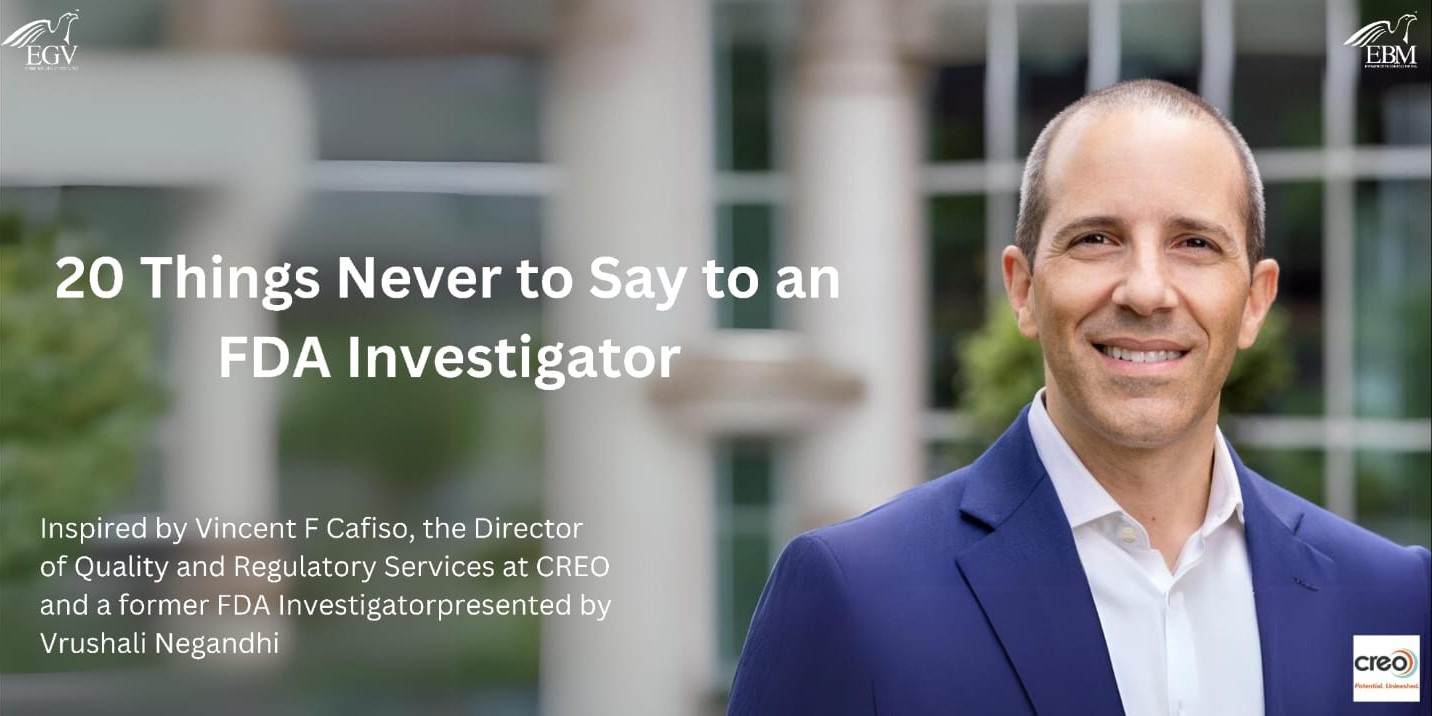
20 Things Never to Say to an FDA Investigator
Inspired by Vincent F Cafiso the Director of Quality and Regulatory Services at CREO and a former FDA Investigator – presented by Vrushali Negandhi
I always look forward to the little anecdotes that Vincent Cafiso shares from time to time. Vincent, the Director of Quality and Regulatory Services at CREO and a former FDA Investigator, has a treasure trove of wisdom. Today’s nuggets of insight transported me straight into a high-stakes “WAR ROOM” with an FDA investigator and several high-level professionals. Here, every word uttered can either save or doom the day.
In this high-pressure environment, certain phrases can set an investigator on edge.
Want to know what they are? Let’s dive into Vincent’s list of 20 things you should absolutely avoid saying to an FDA investigator:
1. “I think…”
Uncertainty can raise red flags. Stick to facts and avoid speculation.
2. “I am not sure but [insert guess here]…”
Guessing can lead to misinformation. If you don’t know, admit it and find someone who does.
3. “I told them not to do it this way…”
Throwing colleagues under the bus isn’t professional and won’t help your case.
4. “You are wrong about this… you don’t know what you are talking about…”
Arguing with an investigator is a surefire way to escalate tensions.
5. “During the last inspection, the FDA investigator saw the same thing and didn’t put it on the 483…”
Each inspection is independent. Prior oversights don’t excuse current non-compliance.
6. “The last investigator was crazy” or “The last investigator didn’t know what they were doing…”
Disparaging previous investigators doesn’t inspire confidence in your current practices.
7. “Well then how would you recommend we fix this deficiency?”
It’s not the investigator’s job to solve your compliance issues.
8. “That is the way we have always done it…”
Tradition isn’t a justification for non-compliance. Regulations evolve, and so should your practices.
9. “I probably shouldn’t say this, but….”
If you feel the need to preface with this, it’s best left unsaid.
10. “If we followed those procedures, we would never get anything done.”
Efficiency doesn’t trump compliance. Both are achievable with the right
processes.
11. “We don’t have enough people or time to review all those complaints…”
Resource constraints aren’t valid excuses for failing to meet regulatory obligations.
12. “The management of this firm is only concerned with profits and does not take quality seriously.”
This kind of comment can trigger a deeper investigation into your company’s practices.
13. “I do it this way because our procedure does not make any sense.”
Non-compliance isn’t justified by poor internal procedures. Fix the procedures instead.
14. “I will change the procedure right away.”
Sudden changes can appear reactionary. Show that you have a robust change control process.
15. “If you think that’s bad, you should see this…”
Offering up additional issues isn’t advisable unless specifically asked.
16. “We fixed the problem by firing the person.”
Personnel changes don’t always address systemic issues. Show how processes have improved.
17. “That’s not my fault. It was the previous person who did that…”
Accepting responsibility reflects better on the organization than deflecting blame.
18. “That’s not my problem, that is quality assurance’s problem.”
A fragmented approach to compliance is concerning. Demonstrate teamwork and accountability.
19. “Write it on the 483 – that is the only way we will correct it.”
Surprisingly common, but a poor approach. Strive to fix issues proactively.
20. “Are you going to shut us down?” or “Are we going to get a Warning Letter?”
Prematurely asking about outcomes can seem defensive or defeatist. Focus on addressing the findings.
 Side Note on #19: As an investigator, I was always surprised when firm officials asked me to write things on the 483—it happened more often than you’d think!
Side Note on #19: As an investigator, I was always surprised when firm officials asked me to write things on the 483—it happened more often than you’d think!
Final Thought: Navigating an FDA inspection requires preparation, transparency, and professionalism. Have you had any unexpected or humorous interactions during an FDA inspection? Share your experiences and what you’d add to this list!


Thanks for the sensible critique Me and my neighbor were just preparing to do a little research on this We got a grab a book from our local library but I think I learned more clear from this post I am very glad to see such magnificent info being shared freely out there
Hello eminencegroupco.com administrator, Nice post!
Thanks for finally talking about > %blog_title% < Loved it!